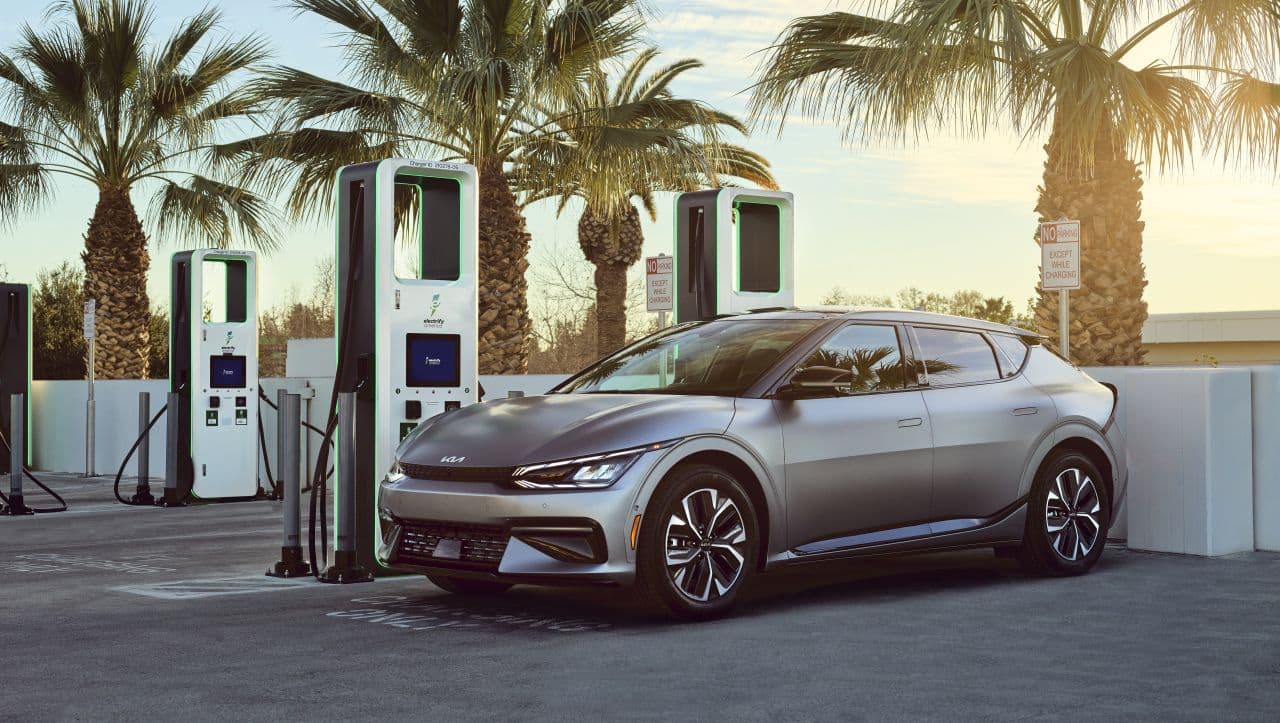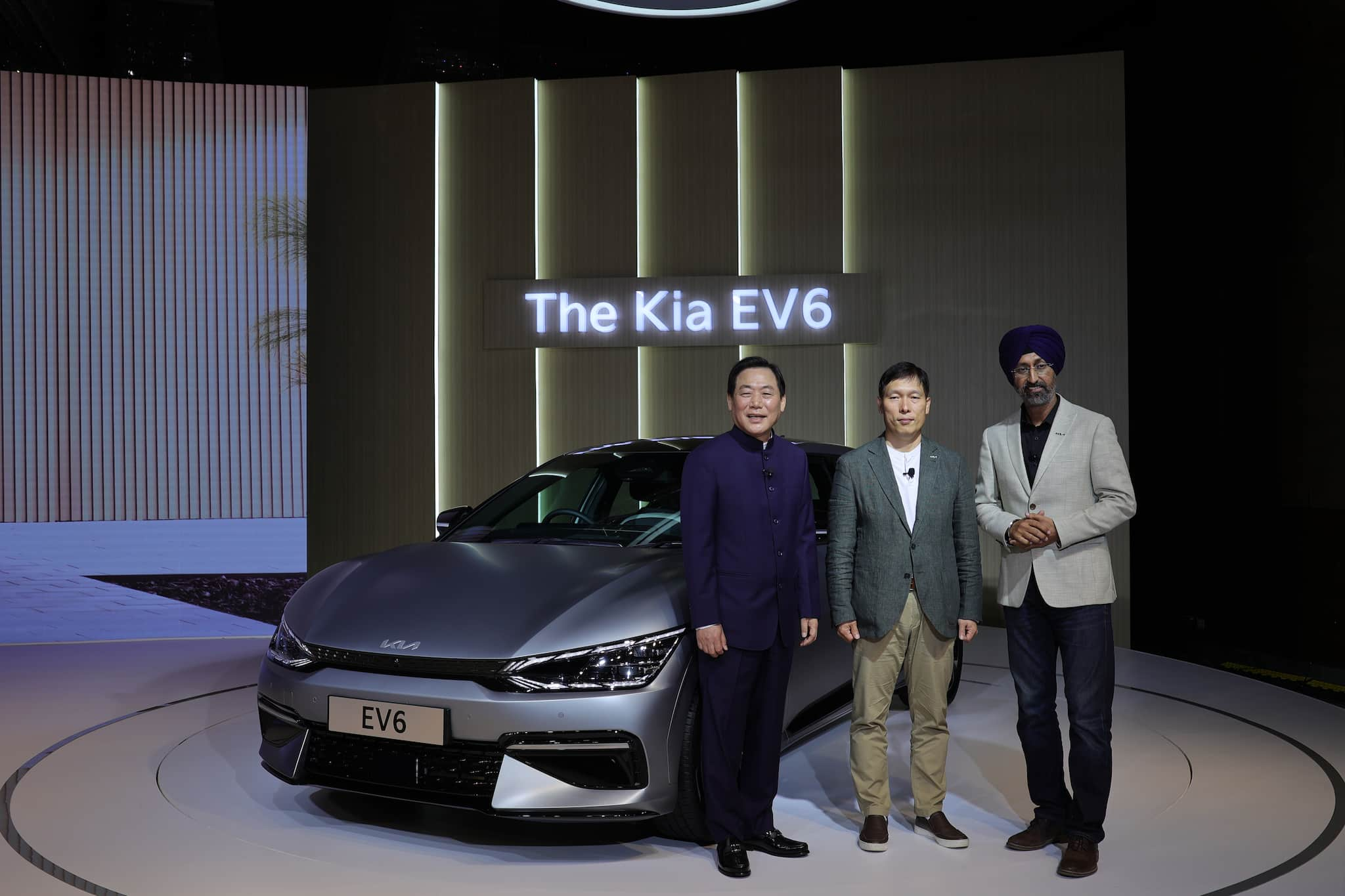



The Kia EV6 was launched in India on June 2 at Rs 59.9 lakh (ex-showroom), marking an inflection point for the country’s EV market, with the South Korean car maker putting up the “sold out” sign immediately, as the inaugural tranch of100 units have already found takers.
A week before EV6 came into the Indian market, BMW launched its electric vehicle, the i4 electric sedan, at an introductory price of Rs 69.90 lakh. With both the EV6 and the i4 so closely priced, it’s time to take a look at how the two stack up.
Also READ: Six things you need to know about the Kia EV6
Power
The BMW i4 is offered in a single eDrive 40 variant, which comes with an 83.9 kWh battery as standard which makes 340hp of power and 430 Nm of peak torque via a rear-axle mounted motor.
The EV6 is sold in both rear-wheel drive (RWD) and all-wheel drive (AWD) variants. The RWD variant costs Rs 59.9 lakh, a cool Rs 10 lakh less than the Bimmer. However, power levels are considerably lower at 229 hp with 350 Nm of torque.
Also read: Here's all you need to know about i4 eDrive 40, BMW’s second EV for India
The AWD version, priced at Rs 64.96, makes a solid 347hp of maximum power with peak torque of 605 Nm, both of which exceed those of the BMW, which costs Rs 5 lakh more. AWD traction also allows the EV6 to sprint to 100kph in a claimed 3.5 seconds as compared to the BMW’s 0-100kph time of 5.7 seconds.
In the EV6 and the i4, the top speed is electronically limited to 192kph and 190kph, respectively.
 The EV6 is one of Kia’s most advanced models with solid range figures and decent power output numbers. (Image: Kia)
The EV6 is one of Kia’s most advanced models with solid range figures and decent power output numbers. (Image: Kia)
Range
BMW claims that the i4 is the longest-range EV in the country, with a WLTP tested range of 590 km, while Kia says the EV6 is good for 528km, which makes sense given its relatively smaller battery size. While the real-world figures might differ, this round goes to the Bimmer.
Also read: Kia EV6 vs Tesla Model 3: An unconventional but fun comparison
 BMW i4
BMW i4
Charging
Kia has an ace up its sleeve. It will equip 15 of its 236 authorised dealers with a 150 kW fast charger that can charge up the EV6 from 10 percent to 60 percent in over 40 minutes.
The BMW i4, however, while capable of a fast charge using a 205kW charger, can go up to 80 percent in under 30 minutes but those aren’t the fast chargers available across dealerships.
Also read: BMW to have the most extensive EV portfolio in India, says India CEO Vikram Pawah
That said, BMW has a more extensive network of dealer chargers and throws in an 11kW charger for those buying the first batch of i4s. Regenerative braking on the i4 is capable of charging it at rates up to 116 kW.
Vikram Pawah, President and CEO of BMW India, with the new BMW i4 electric sedan.
Features
This round goes to the EV6. While the BMW i4 does come with an M body kit, with optional 17 or 18-inch alloys, a dual-screen layout with a 14.9-inch and 12.3-inch infotainment and instrument cluster, the EV6 takes the crown when it comes to the sheer number of features.
The EV6 comes with eight airbags, a 360-degree camera, and Kia’s Level 2 ADAS system (including forward collision avoidance assistance and lane keep assist). A unique feature is a three-pin socket to charge laptops or other large electronic devices, and, if need be, another EV.
The screen size on the EV6 is smaller with both driver and main screens getting 12.3-inches of real estate, and with BMW’s iDrive system multimedia functionality is safely in its pocket,
But the EV6, with its bevy of features and a longer wheelbase, might be the more utility-focused option, while the Bimmer, is the more dynamic one.
(from Left to Right ) Tae-Jin Park, MD & CEO, Kia India, MyungSik Sohn, Chief Sales Officer, Kia India, and Hardeep Singh Brar, VP and Head of Sales & Marketing, Kia India.
Verdict
Ultimately, this is a theoretical exercise in gauging just how much brand appeal plays a role in similarly specced EVs.
Both the EV6 and the i4 are already sold out and Kia Motors has stated its intent to bring in a fresh allotment, owing to demand that was three times greater than the 100 units allotted to the Indian market.
The electric performance will feel very similar, with regenerative ability, fast charging capabilities and software superiority playing a far greater role than gearbox smoothness or other performance metrics, leveling the playing field for manufacturers of all ranks.
The EV6 and the upcoming Hyundai Ioniq share the same platform and multiple components, with the latter likely to determine Hyundai’s success with EVs in India. With 355 orders placed for the 100 models in stock, it appears that buyers, in a landscape bereft of Tesla, aren’t as brand-conscious when on the lookout for a good electric car.
Discover the latest Business News, Sensex, and Nifty updates. Obtain Personal Finance insights, tax queries, and expert opinions on Moneycontrol or download the Moneycontrol App to stay updated!
Find the best of Al News in one place, specially curated for you every weekend.
Stay on top of the latest tech trends and biggest startup news.